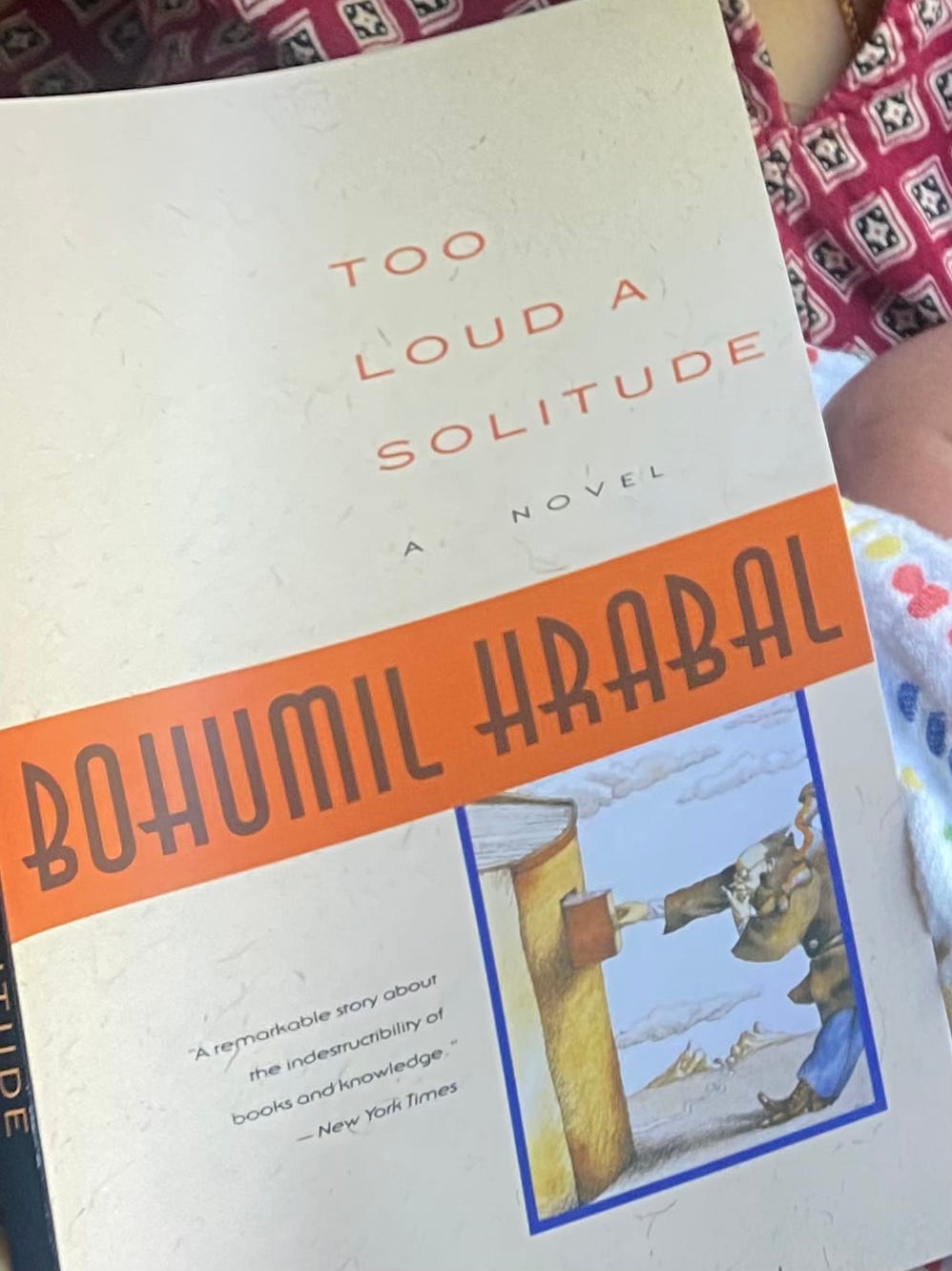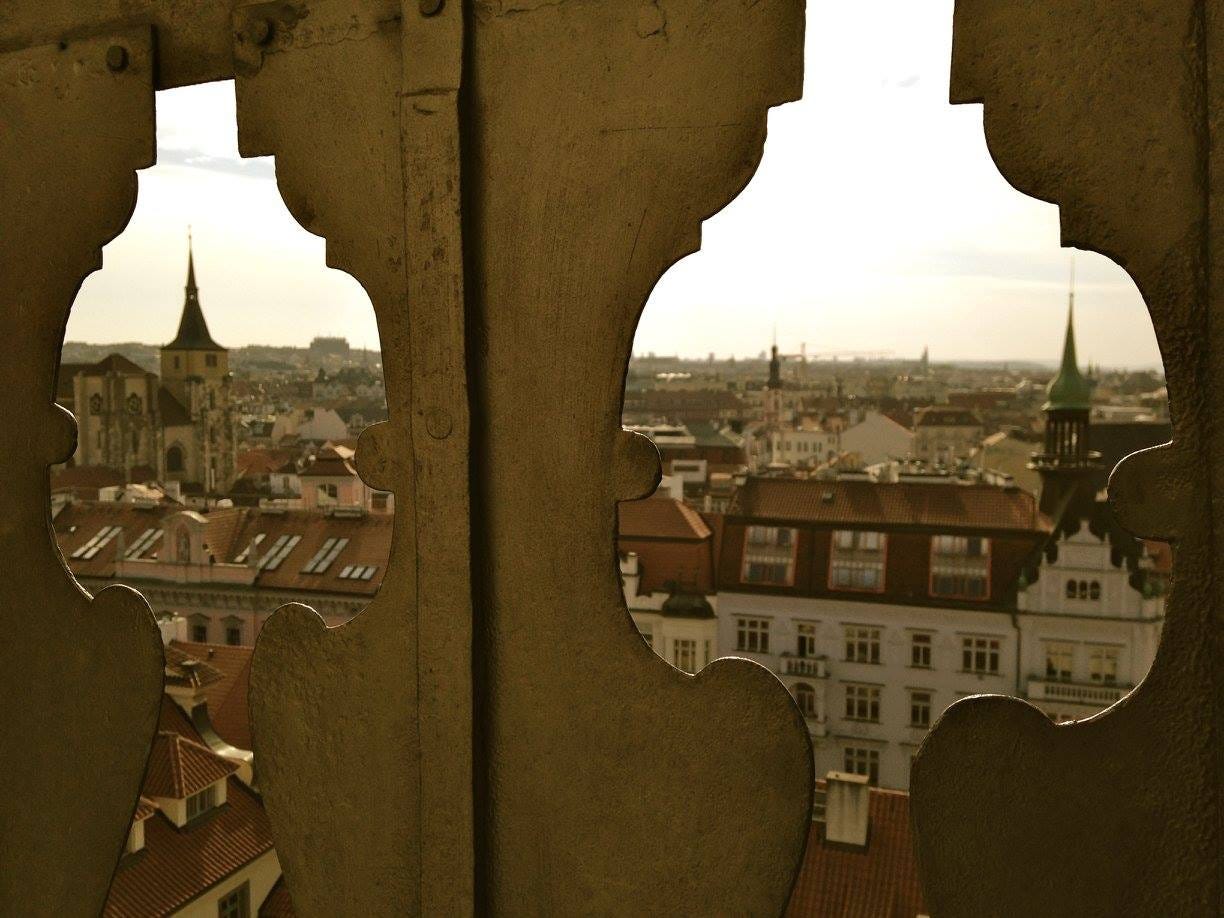COMPACTING BOOKS INSIDE A BRAIN
A late Czech writer moved me so much with his art and craft that I would love for my readers to look for his work. Too Loud A Solitude is yet another serendipitous discovery in a Brooklyn bookstore.
A few miles from where I’m currently staying are the following lines from the first page of a Czech novel I’m reading this week. I hope to find the sentences below on Library Way (at New York city’s Fifth Avenue and 41st Street) right by New York Public Library.
Because when I read, I don’t really read; I pop a beautiful sentence into my mouth and suck it like a fruit drop, or I sip it like a liqueur until the thought dissolves in me like alcohol, infusing brain and heart and coursing on through the veins to the root of each blood vessel.
By the time of Bohumil Hrabal’s death—the story goes that he fell from a fifth-floor window in a Prague hospital while trying to feed the birds—he was one of the world’s most famous Czech writers. An author of nearly fifty books only a handful of which have been translated, the motion-picture adaptation of his novella Closely Watched Trains brought Hrabal international recognition, including the 1967 Academy Award for Best Foreign-Language Film. He was permitted to publish select works only starting in 1976, after he had been sufficiently “rehabilitated” by the government. Ironically enough, this work, Too Loud A Solitude, is all about how when all else fails, books will awe, enlighten, nurture and heal.
I found the first page of Too Loud A Solitude to be a testament to the importance of a book’s opening page; it also offered me an insight into what matters to me as a writer. When I read, I’m expecting to see emphasis on thought and plot but what I crave at a granular level in all that I read is also the attention to craft in a sentence that I can savor like gum drops on my tongue.
Once the communist party came to power in 1948 in Czechoslovakia, Bohumil Hrabal held many odd jobs, including those of a notary clerk, warehouseman, railroad worker, insurance agent, traveling salesman, foreman in a foundry, wastepaper recycling center worker, and stagehand. All these have clearly influenced his storytelling for his sentences thrum with the details of a humdrum existence which nevertheless has proved uniquely meaningful.
The work of the protagonist in Too Loud A Solitude seems to be sheer drudgery. His job in the Czech police state is that of a paper crusher who compacts wastepaper and books. Yet we find the man, this eccentric Haňťa, at the crusher daily—working, reading and saving books from extinction by hauling them to his home. The distractions caused by the books that come his way are endlessly infuriating to his boss who has warned him that he will be thrown out soon enough but Haňťa does not care. Over time, his home has begun to teeter, literally, from the weight of the tomes around him. Some of the most delightful and piercing pages of Hrabal’s work are, of course, those that describe the weight of words inside his living quarters.
And when there was no room for even a single addition, I pushed my twin beds together and rigged a kind of canopy of planks over them, ceiling high, for the two additional tons of books I’ve carried home over the years, and when I fall asleep I’ve got all those books weighing down on me like a two-ton nightmare. Sometimes I’m careless enough to turn in my sleep or call out or twitch, I am horrified to hear the books start to slide, because it would take little more than a raised knee or a shout to bring them all down like an avalanche, a cornucopia of rare books, and squash me like a flea. There are nights when I think that the books are plotting against me for compacting a hundred innocent mice a day, that they want to get even with me, and well they might: our transgressions haunt us.
There are many moving passages that are impassioned pleas to preserve every word that has ever been penned in all corners of the world, no matter the language. With every breath he takes, even when he recounts hilarious scatalogical adventures from his dating life, Haňťa quotes Nietzsche, Goethe, Camus, Lao Tzu and scores of other luminaries. On page after page, we hear the angst in Haňťa’s voice, of the feeling of being jettisoned by everyone who matters. We hear the clang between individual desire and the voice of the powers that be.
The ending of this work is inevitable. It seems to resonate with the author’s own life and the endings he has been known to construct in many other works. The pattern is clear and it seems we have a glimpse into his soul with the words from the last chapter of Too Loud A Solitude.
…I am entering a world where I have never been and holding a book open to the page that says, “Every beloved object is the center of a garden of paradise.” Instead of compacting clean paper in the Melantrich cellar I will follow Seneca, I will follow Socrates, and here, in my press, in my cellar, choose my own fall, which is ascension, and even as the walls press my legs up to my chin and beyond, I refuse to be driven from my Paradise, I am in my cellar and no one can turn me out, no one can dismiss me.




I loved the sentence you had quoted - "Because when I read, I don’t really read; I pop a beautiful sentence into my mouth and suck it like a fruit drop, or I sip it like a liqueur until the thought dissolves in me like alcohol, infusing brain and heart and coursing on through the veins to the root of each blood vessel." That's pretty powerful and evocative. Was this book in English or a translation? The translator seems to have done a marvelous job.
Kalpana! What a wonderful find and you write about the author’s Paradise of reading books in the midst of suppressed life under communism so beautifully.